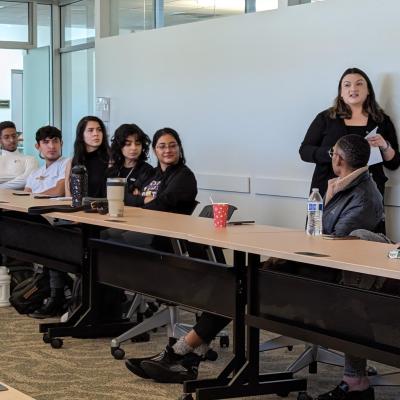Justice Studies professor, Gregory Broberg collaborated with the Better Business Bureau and ABC15-Let Joe Know, consumer help-line, to give his students the opportunity to practice justice in the real world. This course allowed student to work with Phoenix metropolitan community members and help them solve their issues with local businesses. The course reflects the ASU charter by assuming responsibility for the economic, social and cultural health of the community.
To wrap up the semester, students presented the cases they solved, ones that are still in resolution, and tips for consumers when working with businesses.
Poorva Sharma’s most recognized case was a moving company who was holding her client’s belongings. Her client recently made a move across the country and the moving company had been holding their property for four months. Poorva’s calls went unanswered by the moving company and when she did get ahold of them, they demanded that she get consent from her client to discuss her client’s matters. Upon getting consent, the company blocked Poorva. She could no longer handle the issue, so she sat down with her client to give some tips and left the case unresolved. Poorva’s tip for consumers is to make sure you read the fine details in all contracts.
Gabriella La Caria resolved a case with a client and broken solar heaters. Her client had recently installed new solar heaters for their pool and one began to leak. Her client called the contractors and they deemed the solar heater was damaged in transit, so it was replaced at no cost. Three months later, the other heater began to leak. Contractors came to patch this second one, which shocked Gabby’s client, as the first heater had the same issue and it was replaced because it was damaged in transit. Gabby then attempted to speak with the manufacturers about the transit problem and had no luck in addressing the underlying issue. Gabby once again spoke to the contractors and was able to get this second panel replaced as well. Gabby’s tip for consumers is to read the fine print and research companies before you give your time and money; even if they have great reviews, that doesn’t mean that the company is doing what is best for consumers.
Adrianna Guerra worked with a client that was charged incorrectly for a radiology bill. The initial bill was paid for by the client’s insurance and all was taken care of. Not long after, the client was incorrectly charged a second time without knowing. By the time the client realized, the second bill was already in debt collections. Upon calling insurance, the radiology company and debt collections, the client was told that they would need to sort it out with the radiology company before debt collections could remove it. Thanks to the client’s detailed list of phone calls and insurance payments, Adriana was able to sort out the issue with her client and the radiology company. Adriana’s tip for consumers is to document every phone call with companies, including when you called, what you called about, who you spoke to, and the outcome of the phone call.
Professor Gregory Broberg’s course allowed students the chance to get closer to consumers and see how justice can be handled in the real world, even in smaller cases. Each student was grateful for the hands-on experience and is excited to continue their careers in justice.
